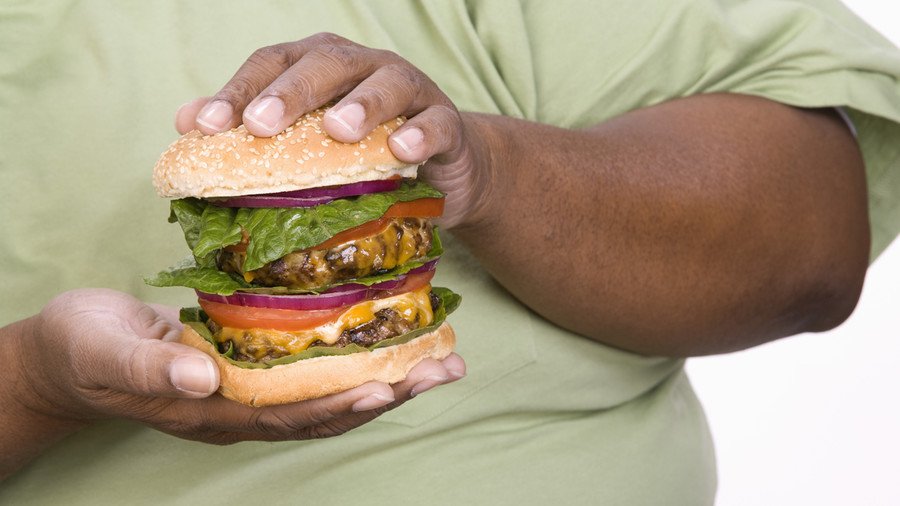Is humanity eating itself into an early grave?

Despite advancements in science and medicine working to prolong our lives, our lifestyles offset their effects. In the past infectious diseases caused millions of premature deaths, now an obesity pandemic threatens to do the same.
The significant increase in life expectancy seen around the globe during the past century is primarily attributed to a reduction in child mortality, improved sanitation, the manufacture of new medicines and vaccines, and numerous other advancements in science and healthcare. Life spans for residents of the UK and USA increased from around 50 to 80 years during this time. This heartening news does, however, mask differences in life expectancy between poor and affluent citizens of those countries. The wealthiest communities in the UK typically live seven years longer than their poorer counterparts and benefit from an additional 17 years of good health during their lifetimes. Research reveals a 20-year difference in life expectancy exists between individual counties in the USA.
Moreover, the aforementioned steady rise in US citizens’ overall longevity has now stalled. The US-based public health body the Centers for Disease Control and Prevention (CDC) recently reported the overall life expectancy (with both sexes included) fell by 0.1 years between 2014 and 2015 to 78.8 years. Life expectancy among Americans aged 65 remained static during this time, and a negligible change in the infant mortality rate was deemed insignificant, suggesting that the increasing number of deaths which produced the statistic did not occur at either extreme of life. The CDC also noted a small but concurrent increase in eight of the top ten causes of death among Americans, including heart disease, stroke, and diabetes.
Although a single year hardly makes a trend, new figures released earlier this month revealed the life expectancy of the US population fell again in 2016 to 78.6 years: the first time a fall has occurred two years in a row since the early 1960s. A rise in the number of, mostly unintentional, deaths from opioid overdoses (including both heroin and pharmaceutical drugs) is believed to be partly responsible for this further decrease.
The UK population’s gradual increase in life expectancy has also leveled off in the several years since a Conservative government first implemented austerity measures in the wake of the global financial crisis. Although government policies and cutbacks certainly impact upon a population’s health, other factors such as sedentary lifestyles, decreased physical activity and unhealthy diets cannot be ignored.
According to the World Health Organization (WHO), almost two billion people over the age of 18 (roughly 40 percent of the world’s adult population) are overweight, and 650 million of these are classed as obese. The prevalence of global obesity has tripled in the past 40 years. Whereas only four percent of children and adolescents globally were overweight or obese in 1975, the figure now stands at 18 percent. Europe and North America are not the only ones affected: the WHO comments that, except some parts of Asia and sub-Saharan Africa, there are now more obese than underweight people in all regions of the world. Obesity rates have increased by at least twofold in 73 countries since 1980.
The global fast food market, valued at $477.1 billion in 2013, is set to be worth $617.6 billion by 2019. As markets in the developed world become saturated, junk food manufacturers are exporting their products to poorer countries providing untapped business opportunities.
In 2014 the president of Coca-Cola International Ahmet Bozer advised investors that “half the world’s population has not had a Coke in the last 30 days … There’s 600 million teenagers who have not had a Coke in the last week. So the opportunity for that is huge.”
Obesity, unhealthy diets and physical inactivity are key risk factors for the development of cardiovascular diseases (CVDs). CVDs include heart disease and stroke and are the leading cause of death worldwide; more than three-quarters of these deaths now occur in low and middle-income countries.
While large swathes of humanity are literally eating themselves into an early grave, innumerable diets, exercise regimes, and food supplements abound promising rapid weight loss and other health benefits. Akin to the worldwide fast food market, the global “weight management market,” which benefits from the existence of the former, is expected to be worth $442.3 billion by 2025. One of the most common Google searches is “how to lose weight?”
Dieticians, nutritionists, and psychologists have warned against the unsustainability of ‘crash diets’ promising rapid weight loss and the negative effects these diets can have on a person’s mental well-being.
Low carbohydrate diets initially precipitate rapid weight loss. The human body converts carbohydrates to glycogen, which is then stored in the liver and muscle tissue. Water binds to glycogen in a ratio of roughly three grams water to one gram glycogen. Eliminating carbohydrates from one’s diet results in the loss of both the body’s glycogen stores and the water to which it is bound. The initial feelings of satisfaction may turn to despair when the body’s glycogen stores are gone, and the fast pace of weight loss slows or even reverses.
A new trend known as biohacking, which can involve fasting for days at a time and using nootropics’ or ‘smart drugs’ to ‘hack’ or improve the way the body and mind function, is being popularized by Silicon Valley executives who claim it improves their productivity and brain power. Some leading nutritionists have expressed doubts about the long-term benefits of fasting while the jury is still out when it comes to nootropics. In the US nootropics are sold as nutritional supplements, as opposed to drugs, and thus do not fall under the auspices of the Food and Drug Administration (FDA) regulatory agency. Dr. Richard Isaacson, neurologist and Director of the Alzheimer’s Prevention Clinic at Weill Cornell Medical College in New York, cautions against the lack of controlled trials and thorough scientific research on the safety of nootropics. He comments that “You may have several ingredients on the label and there may be one of the many ingredients on there that may interact with your blood pressure medicines or it may interact with something else”, adding that “while each drug by itself may be generally safe, it’s hard to generalize; they may interact with other things …"
A key component to losing weight and staying healthy is to reduce calorie intake or to put it simply: eat less and eat healthily. However, calorie consumption must be reduced at a gradual and steady rate to be both safe and effective. The British Dietetic Association (BDA) advises a person trying to lose weight sets themselves “realistic goals” and suggests “a weight loss of between 0.5 to two pounds (lb) a week is a safe and realistic target” and ought to be combined with a healthy eating plan and regular physical activity. Excess weight does not materialize overnight and likewise cannot be lost as rapidly. If you are in need of a New Year’s Resolution, consider giving less money to both the junk food and weight loss industries and becoming a little healthier and wealthier in return.
The statements, views and opinions expressed in this column are solely those of the author and do not necessarily represent those of RT.
















